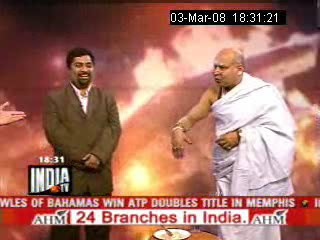The debate went pretty well, actually. In the Christian corner was Tim Thorburn, and the Atheist was Michael Tan.
Atheist Michael did a great job, hitting all the main points. Humans have a need to explain things, and sometimes they make explanations that involve magical beings. But we need to use evidence and reason to sort out what’s happening, and the evidence for Christianity is not particularly strong. The most electric moment: Tim said that the Bible contained predictions that have been fulfilled, and Michael responded that many others haven’t yet, especially the return of Jesus. “How long is it going to take before we realise he’s not coming back?” he said, to gasps and applause from the audience.
Christian Tim argued that Christianity was true because the Bible said so. Okay, he didn’t put it as weakly as that. He mentioned that the Bible contained eyewitness accounts of Jesus’ resurrection, and that Paul alluded to the eyewitness accounts so casually that they must have been well-accepted by the Christians of his day. So that’s the evidence.
“Except it isn’t evidence,” I said to Tim as we chatted afterwards. “It’s another claim.”
“How do you mean?” he asked.
“Well, Paul is claiming that Jesus was resurrected and that there were eyewitnesses to it. But that’s not evidence. That’s another claim, and we need to examine it.
“I mean, it’s part of the same story. You can’t use a part of the story as evidence for the story!”
“Yes, I can!” he said, looking rather surprised.
I also asked him about the Book of Mormon. At the front of every copy of the Book of Mormon, there appears the testimony of three men who claimed that an angel showed them the gold plates. There’s also the testimony of eight other men who claimed that they got to see the gold plates without any angel. I believe these testimonies to be false, to which Tim the Christian readily agreed. But if you’re going to accept the testimony of so-called eyewitnesses in the Bible, why wouldn’t you accept the testimonies of eye-witnesses in the Book of Mormon?
Tim responded that the Bible was a very reliable source of testimony because it had many different witnesses whose testimony dovetailed together so well that it couldn’t all be fiction. I’m not doing his response justice because he said it much better than I can remember, and I hope I’m getting the gist of it right — memory is unreliable. But that was basically the idea; the Bible was so much better a source for eyewitness testimony than other books because it was so complex and dense and interlocking that no one could have faked it and it must be true.
But anyone who’s heard the story of the Nottingham Lion or heard conflicting reports from eyewitnesses at accident scenes knows that eyewitness accounts are not reliable sources for what really happened. Especially when the story has had hundreds of years to get itself straightened out.
Anyway, it was a fine outing. Michael and Tim were good gentlemen to talk to. And the UWA Atheist and Agnostic Society has a Facebook group, if you’re a person of the ‘Book.


Recent Comments